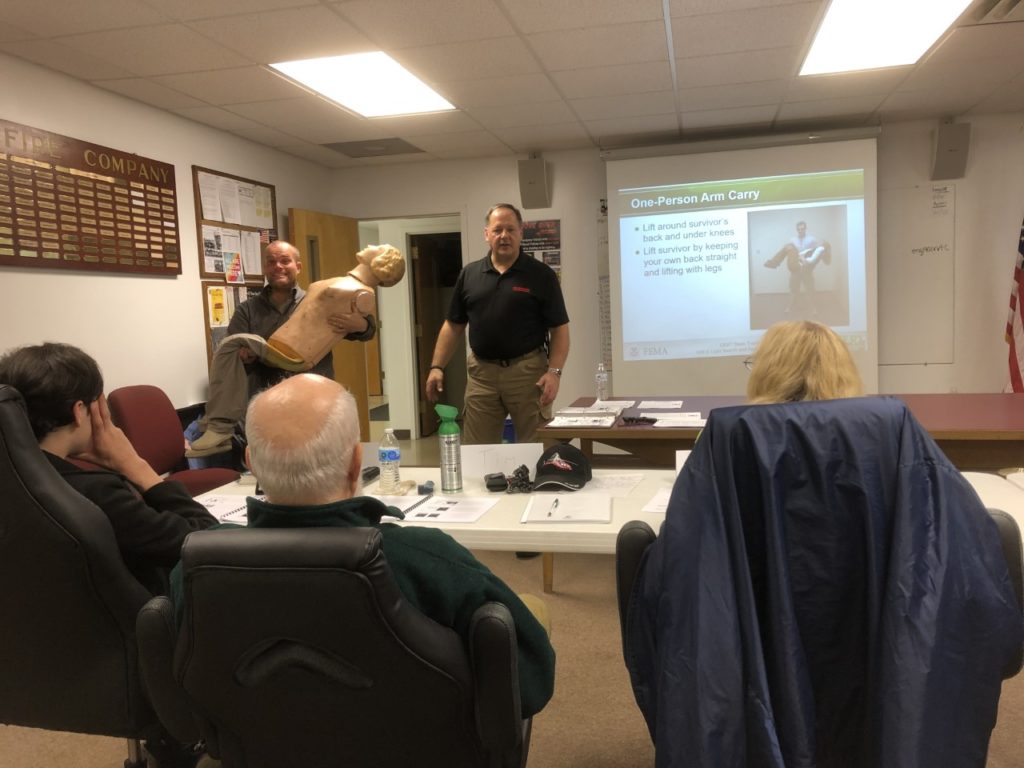A Community Wide Call to Veterans
As you reflect on your community and your role in that community, think of how you can best serve during this time of pandemic crisis.

Army veteran, Martin (Marty) Kopcho, trains local community members how to support disaster response for incidents that may impact their area. Trainings can include basic disaster response skills, such as fire safety, light search and rescue, first aid, and most importantly team organization. These community members are currently teaming with their local town in COVID-19 response efforts.
Courtesy of Nina Saeli
Army veterans are considered ‘Soldiers for Life’, and we have been charged with the mission to ‘Tell the Army Story’. No matter your branch of service, Army, Navy, Air Force, Marines, or Coast Guard, now the time has come for us to not just tell our story, but to ‘Demonstrate our Story’. When we left military service, we left our community. A community in which we lived and worked that both shared and demonstrated common ideals, values, and work ethics. After leaving service each of us sought and found a new community, and each of us defines ‘community’ in a different way now: it may be the business for which you work, your school and students you teach, the patrons that come into your store, your congregation, your constituents, or maybe just your neighbors.
As you reflect on your community and your role in that community, think of how you can best serve during this time of pandemic crisis. Some of us hold leadership positions and can influence or provide direct assistance. Some of us work in an office as part of a team or may even work alone and oversee only ourselves. Whatever rapport we have with those whom we live and work, there are friendships and even partnerships. Through these interactions with your community, we can begin to ‘Demonstrate the Military Story”.
Our story starts with the individual, the assessment of that individual’s skills and knowledge, and how those capabilities can fit into the larger ‘community’ structure. In a community these individual skills and knowledge are the building blocks for sustainability and resiliency. Hard to fathom, but many communities fail to understand the strengths of individual community members, and how those individuals might be used to strengthen a community.
Next, our story informs us how individuals come together to build teams. In our military experiences, strong teams made the difference between life and death. Much may be said for this concept as it relates to our local communities in the coming months and years as we continue to respond to the coronavirus. Do not take team building skills for granted, as not all communities are structured in a such a way to facilitate this occurring naturally. Some communities need support when building teams.
The part of our story that brings it all together is leadership, and this is where the most important part of your story can inform and help our communities. Leadership already exist in our communities in various forms from CEOs and directors to superintendents, mayors, supervisors, etc… Yet under current circumstances some leaders may be struggling in these positions because of unfamiliar circumstances brought about by this pandemic. You may say, “but I am not in a leadership position”. A person does not have to be in a leadership position to lead, mentor, coach, and train. Many times, our local leaders only need confidence and encouragement, along with some insight on how to bring individuals together, how to build teams, and how to communicate to their community in a way that fosters a sense of safety and care. This is something all of us know how to do.
A premise exists within the constructs of emergency management which states, “All disasters begin and end locally.” Upon this premise emergency preparedness coordinators across the nation work to educate local citizens to take care of themselves and their families during crises, while local first responders focus their efforts on those citizens who have the most significant needs. Yet, in some parts of the country, there are many in need for more than just medical care; they are in need of food, of work, of advice, of social contact, of encouragement, or even just someone to call and say “How are you doing today?”.
Our country and our communities need us more than ever. We do not need to be in a uniform to serve. We need only to demonstrate the key fundamentals we were trained and taught while in service and use the knowledge and those skills to build a stronger, more resilient community!

